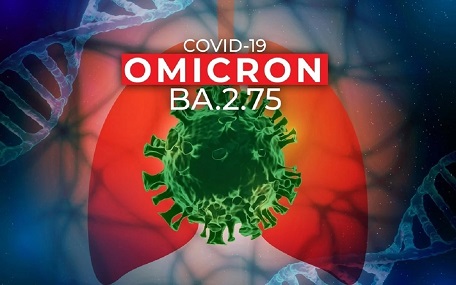BREAKING! Japanese Study Indicates BA.2.75 The Next Variant To Follow After The BA.5 Surges Is Not Only More Transmissible But Also More Pathogenic!
Source: SARS-CoV-2 BA.2.75 Variant Aug 09, 2022 2 years, 8 months, 2 weeks, 3 days, 23 hours, 31 minutes ago
A new study by researchers from Japan have found that the BA.2.75 variant that is expected to follow after the BA.5 surges along with possibly another new emerging variant ie BA.4.6, is not only more transmissible than the BA.5 variant but also more pathogenic than the original BA.2 variant.

The SARS-CoV-2 Omicron
BA.2.75 emerged in May 2022. BA.2.75 is a BA.2 descendant but is phylogenetically different from BA.5, the currently predominant BA.2 descendant.
The study team demonstrated that the effective reproduction number of BA.2.75 is greater than that of BA.5. While the sensitivity of BA.2.75 to vaccination- and BA.1/2 breakthrough infection-induced humoral immunity was comparable to that of BA.2, the immunogenicity of BA.2.75 was different from that of BA.2 and BA.5.
The study team claimed that three clinically-available antiviral drugs were effective against BA.2.75.
However, the study findings showed that BA.2.75 spike exhibited a profound higher affinity to human ACE2 than BA.2 and BA.5 spikes. The fusogenicity, growth efficiency in human alveolar epithelial cells, and intrinsic pathogenicity in hamsters of BA.2.75 were comparable to those of BA.5 but were greater than those of BA.2.
The study team’s multiscale investigations suggest that BA.2.75 acquired virological properties independently of BA.5, and the potential risk of BA.2.75 to global health is greater than that of BA.5.
From the study findings, experts are warning that the next consecutive wave involving the BA.2.75 variant is likely to cause an increase in hospitalizations and deaths globally due to disease severity the new variant is able to inflict in many. ARDs along with the need for supplemental oxygen and also ventilators is going to be a common manifestation.
The study findings were published on a preprint server and are currently being peer reviewed.
https://www.biorxiv.org/content/10.1101/2022.08.07.503115v1
The study findings also indicated that BA.2.75 exhibits more severe airway epithelial and endothelial barrier disruption than BA.2.
Notably, BA.2.75 infection also showed significantly bigger plaques than BA.2 infection. Together with the results of cell-based fusion assay and airway-on-a-chip infection experiments, these observations suggest that BA.2.75 is more fusogenic than BA.2, and the fusogenicity of BA.2.75 is comparable to that of BA.5.
The study findings also indicated that the mutations N460K and D339H substitutions cooperatively determine the higher fusogenicity of BA.2.75.
However, on the other hand, BA.5 and BA.2.75 infections seemed to persist in the bronchial/bronchiolar epithelium, and particularly, BA.2.75 invaded the alveolar space more efficiently than BA.5 at the early stage of infection.
Worryingly, the study data suggest that among Omicron subvariants, BA.2.75 is more efficient in spreading into the alveolar space than BA.2 and BA.5, with persistent infection in the bronchi/bronchioles.
The study findings also suggest that BA.2.75 exhibits more significant inflammation than BA.2. To clarify
the area of pneumonia, the inflammatory area, which is mainly composed of the type II pneumocytes with some inflammatory cell types, such as neutrophils, lymphocytes, and macrophages, is termed the area of type II pneumocytes and was morphometrically analyzed. At 5 d.p.i., the percentages of the area of type II 505 pneumocytes of Delta, BA.5 and BA.2.75 were significantly higher than that of BA.2. Altogether, these findings suggest that BA.2.75 infection intrinsically induces greater inflammation and exhibits higher pathogenicity than BA.2.
Health authorities, hospitals and physicians need to be better prepared to deal with the next consecutive surges involving the BA.2.75 variant which is expected to cause more disease severity.
For more on the
BA.2.75 variant, keep on logging to Thailand
Medical News.
